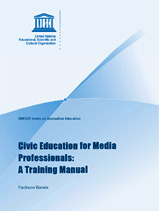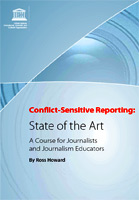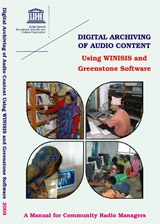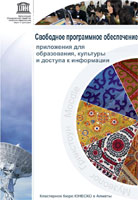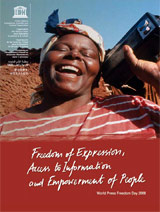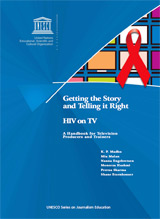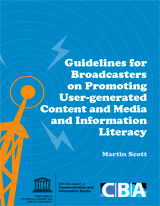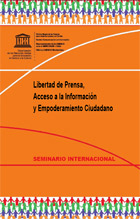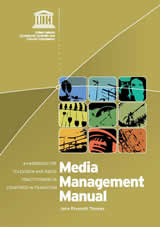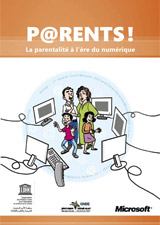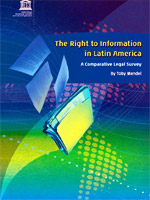This Report assesses the overall state of media development in the Maldives, based on UNESCO's Media development indicators: a framework for assessing media development. The assessment of the Maldives takes into account the special situation of the country, particularly in terms of its size and consequent relative lack of capacity.
Date de publication: 2009
The publication focuses on the underlying nexus of democracy, development and the media based on the fundamental principles of democracy and human rights that lie at the heart of UNESCO’s mandate.
Date de publication: 2009
Written by Ross Howard, who teaches journalism at Langara College in Canada and is the President of the non-profit Media and Democracy Group, the Curriculum provides guidance to a better understanding of conflict and conflict resolution and the news media’s role.
Date de publication: 2009
This publication is a self-instructional handbook aimed at helping managers of community radio stations, FM radio stations, public service broadcasting agencies and any other organizations that deal with audio files in creating prototype archives of digital audio documents.
Date de publication: 2009
Human Rights in Community Media: Citizenship in Our Daily Life presents basic notions of civil, political and social rights, together with other issues. It is available exclusively in electronic version, free for download.
Date de publication: 2009
Written by Daniel Pimienta, Daniel Prado and Alvaro Blanco, this publication is an update to the previous UNESCO study on this subject that was issued for the World Summit on the Information Society in 2005.
Date de publication: 2009
The guide Свободное программное обеспечение. Приложения для образования, культуры и доступа к информации has been produced by UNESCO’s Office in Almaty in the framework of its project ‘FOSS for Education, Culture and Access to Information’.
Date de publication: 2009
This book is a compilation of contributions by the participants of the conference held in Maputo, Mozambique, in May 2008, on the occasion of World Press Freedom Day. A wide variety of authors, from journalists to academics and civil society, express their views on how freedom of information and freedom of expression can help people gain control over their lives.
Date de publication: 2009
This publication is one of the outputs of the Freedom of Information and Women’s Rights in Africa Project, a regional programme launched by FEMNET in partnership with UNESCO.
Date de publication: 2009
This handbook is a timely, illustrated and easy-to-read guide and resource material for journalists. It evolved primarily out of a desire to equip all journalists with more information and understanding of gender issues in their work. It is addressed to media organisations, professional associations and journalists’ unions seeking to contribute to the goal of gender equality.
Date de publication: 2009
The handbook is a reference and toolkit designed in three parts to support information and training needs by television producers and trainers. It draws examples from diverse productions including those of UNESCO’s Network of Young Television Producers on HIV and AIDS.
Date de publication: 2009
For the first time guidelines have been published on how broadcasters around the world can encourage audiences to produce better quality user-generated content and to improve media and information literacy. The new guidelines will also enable the public to become more media and information literate.
Date de publication: 2009
Esta publicación reúne las ponencias y discusiones desarrolladas en el marco del Seminario “Libertad de Prensa, Acceso a la Información y Empoderamiento Ciudadano”, celebrado en ocasión del Día Mundial de la Libertad de Prensa 2008, organizado por la Oficina Cluster MERCOSUR de UNESCO con la participación de conferencistas de los países del MERCOSUR Argentina, Brasil, Paraguay, Uruguay, y conectado por video conferencia con panelistas de Chile y España.
Date de publication: 2009
The Mapping of communication and journalism training institutions and programmes in Latin America and the Caribbean was conducted by FELAFACS following UNESCO’s request.
Date de publication: 2009
This publication, produced jointly by UNESCO, the UN Alliance of Civilizations, the European Commission and Grupo Comunicar, offers a comprehensive and multidimensional approach to media education. It provides answers to key questions for media, communication and education professionals, researchers and policy makers.
Date de publication: 2009
The manual is designed with a specific focus on Public Service Broadcasting, but it could be used by every interested individual or media practitioner.
Date de publication: 2009
This handbook on media regulation and self-regulation is based on the outcomes of the International Summer School organized in 2009 in Belarus with the support of UNESCO’s Moscow Office. The event targeted media law experts and media educators from Armenia, Azerbaijan, Belarus and the Russian Federation.
Date de publication: 2009
Ce guide, aborde les grands principes de l’exercice de la parentalité à l’ère numérique et fournit une série de conseils et de solutions pour guider les actions des parents et des éducateurs au quotidien. Son objectif est de les aider à accompagner les enfants dans un univers merveilleux mais qui peut présenter parfois quelques difficultés.
Date de publication: 2009
This publication is the first in-depth study about the most recent and relevant trend in journalistic reporting on police, criminality and security policies. The collection of information and the blogs’ analysis were done through an Internet survey answered by 73 police bloggers, authors of 70 blogs, between May and June 2009.
Date de publication: 2009
This legal survey, published by UNESCO’s Office in Quito, compares the existing right to information laws in 11 Latin American countries: Chile, Colombia, Dominican Republic, Ecuador, Guatemala, Honduras, Mexico, Nicaragua, Panama, Peru and Uruguay.
Date de publication: 2009







